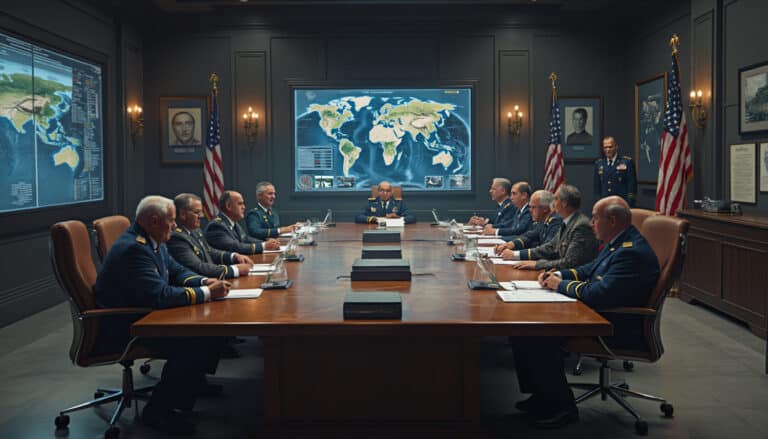The European defense industry is undergoing a radical transformation. Strategic alliances are forming to strengthen the military sovereignty of the continent. In this dynamic context, the Belgian group John Cockerill stands out for its ambition.
With ongoing negotiations for the acquisition of the French manufacturer Arquus, John Cockerill aims to create a true European champion in the defense industry. Meanwhile, the Italian giant Leonardo and the German Rheinmetall have announced the formation of a joint venture, demonstrating a willingness to pool skills. The German Chancellor Olaf Scholz recently called for “large-scale” production in Europe, thus strengthening efforts for strategic autonomy. These moves illustrate a trend towards a more unified and resilient defense industry on the Old Continent.

In a constantly evolving global context, the consolidation of the European defense industry is becoming an urgent necessity. Armin Papperger, the head of Rheinmetall, and other industry leaders, including the head of John Cockerill, advocate for a merger of key players to create a true European champion in defense. This initiative aims to strengthen competitiveness, pool resources, and respond more effectively to current security challenges.
Table des matières
ToggleWhy is the merger of the arms industry in Europe necessary?
The defense industry in Europe is currently fragmented, with many national players operating independently. This fragmentation limits Europe’s ability to compete effectively in the global market. According to experts, a merger would not only optimize resources but also stimulate innovation and reduce weapon development costs. Furthermore, a unified industry would strengthen Europe’s position in international negotiations and increase its capacity to respond in a coordinated manner to emerging threats.
What is John Cockerill’s role in this initiative?
The Belgian industrial group John Cockerill plays a central role in this merger initiative. By negotiating the acquisition of the French manufacturer Arquus, John Cockerill aims to create a European leader in the field of land weapons. This strategic acquisition is part of a broader vision of consolidation, aiming to bring together various European players to form a powerful entity capable of competing with global giants. This approach is supported by government initiatives and significant investments, particularly from Belgium and France.
What are the current challenges facing the European defense industry?
The defense industry in Europe faces several major challenges. Among them are market fragmentation, strict regulations, and intense global competition. Additionally, defense budgets are often constrained by national budgetary limitations, making it difficult to develop advanced technologies. The COVID-19 pandemic and increasing geopolitical tensions, particularly related to the war in Ukraine, have also highlighted the need for a unified and coordinated response. Moreover, the “war economy” promoted by certain governments, such as that of Emmanuel Macron, raises questions about the sustainability and ethics of such strategies.
How will recent acquisitions impact the sector?
Recent acquisitions, such as that of John Cockerill over Arquus, have the potential to redefine the landscape of the defense industry in Europe. By integrating the production capabilities and expertise of several companies, these mergers will foster innovation and enable the development of more sophisticated and integrated solutions. For example, the collaboration between Rheinmetall and Leonardo to create a joint venture not only strengthens their market position but also their capability to develop cutting-edge technologies in the fields of combat tanks and defense systems.
What benefits will this merger bring to the European market?
The merger of major defense companies in Europe will offer numerous benefits. On one hand, it will allow for the pooling of resources and skills, resulting in reduced costs and increased operational efficiency. On the other hand, a unified industry will facilitate the development of innovative technologies and the establishment of common standards, thereby strengthening European competitiveness on a global scale. Additionally, this consolidation will ease cooperation among European countries, promoting a more coordinated response to security challenges and better resource allocation in joint projects.
What is the impact of government policies on this initiative?
Government policies play a crucial role in the consolidation of the defense industry in Europe. The German Chancellor Olaf Scholz, for example, has recently launched initiatives aimed at boosting “large-scale” production in Europe. These policies include economic reforms, such as relaxing budget constraints, allowing defense companies to have more resources to invest in research and development. Additionally, the support of national governments, such as those of Belgium and France, is essential for overcoming regulatory hurdles and facilitating the mergers and acquisitions necessary to create a true European defense champion.
How does technology influence the consolidation of the defense industry?
Technology plays a pivotal role in the consolidation of the European defense industry. Technological innovation is at the heart of merger strategies, enabling companies to develop more advanced and integrated defense systems. Advances such as quadcopter drones dedicated to detection and attack missions, presented by Anduril, or sophisticated infrared sensors, illustrate the importance of cutting-edge technologies in this sector. Moreover, the integration of artificial intelligence and additive manufacturing in the production of defense equipment enhances quality and performance while reducing production times.
What are the hopes and fears surrounding this merger?
The merger of the defense industry in Europe generates both hopes and fears. On one side, proponents see this consolidation as an opportunity to strengthen European security, increase innovation, and create skilled jobs in the defense sector. On the other hand, some fear that this merger may lead to excessive concentration of economic and technological power, thus reducing the diversity of players and potentially limiting transparency and accountability. Furthermore, ethical concerns arise regarding the increase in weapon production and its impact on global stability.
What is the position of international players regarding this European initiative?
International players are closely watching the consolidation of the defense industry in Europe. Countries like the United States, which are major actors in this field, view this initiative either as an opportunity for strengthened partnership or as increased competition. For example, in light of the American disengagement in Europe, as reported in a BFM 8 PM video, the arms race on the Old Continent is taking on a new dimension. Cooperation or rivalry between European giants and global powers will largely determine the future of international security.
How will this merger affect small and medium-sized enterprises (SMEs) in the defense sector?
The consolidation of the defense industry in Europe will have significant repercussions for SMEs. On one hand, a larger and unified industry could offer new opportunities for collaboration and subcontracting for SMEs, thus stimulating their growth and innovation. On the other hand, the dominance of large players could make it harder for small businesses to access the market, as they may find themselves in direct competition with more powerful entities. It will be crucial for merger policies to include support measures to ensure that SMEs can continue to thrive and contribute their unique expertise to the sector.
What are the next steps to realize this industrial merger?
For this merger to be successful, several key steps must be taken. First, obtaining approval from European competition authorities and national governments is essential. John Cockerill, for instance, is confidently awaiting the impending decision from European authorities and Bercy regarding its acquisition plan for Arquus. Next, harmonization of practices and standards among the merged companies will need to be established to ensure smooth and effective integration. Finally, ongoing investment in research and development will be necessary to maintain innovation and meet the evolving demands of the defense sector.
What is the potential impact on European security?
The merger of the defense industry could significantly enhance security in Europe. By uniting their strengths, European companies would be better equipped to develop advanced technologies and sophisticated defense systems capable of effectively addressing contemporary threats. Furthermore, a consolidated defense industry would allow for better coordination and a faster response to crises, whether military or terrorist in nature. However, it is also crucial to monitor and manage the ethical and political implications of this consolidation to ensure that it truly contributes to lasting peace and stability.
How are aeronautical innovations integrated into this merger?
Aeronautical innovations play a key role in the transformation of the European defense industry. Advances such as new aeronautical technologies are transforming the defense mission landscape by providing enhanced capabilities for detection, surveillance, and attack. The integration of these technologies into a consolidated industry will allow for the development of more integrated and interoperable systems, thereby improving the efficiency and range of defense operations. Additionally, innovations in aviation and drones, such as the Bolt quadcopter dedicated to detection and attack missions presented by Anduril, illustrate the importance of cutting-edge technology for the future of European defense.
What are the economic stakes of this merger for Europe?
The merger of the defense industry represents a major economic stake for Europe. By creating a unified player, Europe could not only increase its global market share but also attract more international investments. This would stimulate the creation of highly skilled jobs and promote the development of new technologies and infrastructure. Moreover, a consolidated defense industry could benefit from economies of scale, thus reducing production costs and increasing profitability. However, it is essential to ensure that these economic advantages do not come at the expense of the competitiveness of small enterprises and independent innovation.
What is the reaction of unions and workers to this merger?
Unions and workers in the defense industry express mixed feelings towards this merger. On one hand, the prospect of a stronger industry and greater economic stability can be reassuring and promising in terms of job security. On the other hand, concerns remain about the centralization of power and the potential reduction of jobs due to inefficient synergies and optimizations. For instance, Arquus employees are experiencing social dialogue for the first time during the annual mandatory negotiation with John Cockerill Defense, the new owner of the group since July. It will be crucial to maintain open and constructive dialogue between employers and employees to ensure a smooth and fair transition.
How do European regulations facilitate or hinder this merger?
European regulations play a decisive role in facilitating or hindering industrial mergers in the defense sector. The competition authorities of the European Union must assess each merger to ensure that it does not create monopolies or excessively reduce competition. In the case of John Cockerill and Arquus, special attention is paid to the potential impact on the market and on other European players. Additionally, defense industry support policies, such as those promoted by Chancellor Olaf Scholz, may include tax incentives and subsidies to encourage favorable consolidations. However, strict regulations may also slow down the merger process, requiring close coordination between companies and authorities to overcome regulatory obstacles.
What are the benefits for consumers and European countries?
A consolidated European defense industry offers several benefits for both consumers and European countries. For consumers, primarily governments and armed forces, this translates into access to a wider range of innovative defense products and services, often at lower costs due to economies of scale. Furthermore, robust European production ensures better supply security and strategic independence from foreign suppliers. For European countries, this strengthens national and collective sovereignty in defense matters while creating jobs and stimulating the local economy. Moreover, a unified defense industry can play a crucial role in European security and defense cooperation initiatives, thereby strengthening Europe’s position on the international stage.
What are the examples of past successes in the consolidation of the defense industry?
Historical examples illustrate the potential benefits of consolidation in the defense industry. The merger of Nexter, Thales, and Arquus created significant synergies, enhancing innovation capacity and competitiveness in the global market. Similarly, the union of Rheinmetall and Leonardo to form a joint venture strengthened their position in the field of combat tanks and advanced defense systems. These successes show that consolidation can lead to greater efficiency, better resource utilization, and an increased ability to meet technological and security challenges. However, each merger is unique and must be carefully planned and executed to replicate these successes.
How does this merger align with the overarching strategy of the European Union?
The merger of the European defense industry closely aligns with the overarching strategy of the European Union aimed at strengthening the security and strategic autonomy of the continent. By promoting a unified defense industry, the EU seeks to reduce its dependence on foreign suppliers and ensure better coordination of its military capabilities. This initiative is also part of the EU’s efforts to stimulate technological innovation and economic competitiveness while addressing rising security concerns in Europe. Furthermore, this merger contributes to the realization of the EU’s common defense objectives, fostering closer cooperation among member states and enhancing collective capability to face emerging threats.
What are the future prospects for the defense industry in Europe?
The future prospects for the defense industry in Europe are promising, especially with the merger initiative of major players like John Cockerill and Arquus. As the industry becomes more unified and integrated, an increase in innovation, improved competitiveness, and a better capacity to respond to global security challenges can be expected. Additionally, the focus on advanced technologies, such as artificial intelligence, additive manufacturing, and early warning systems, positions Europe as a potential leader in technological defense. However, the success of this initiative will depend on the ability of companies to collaborate effectively, the ongoing support of European governments, and the capacity to navigate regulatory and economic challenges.
How can international partnerships influence this merger?
International partnerships play a decisive role in the consolidation of the European defense industry. By collaborating with foreign partners, Europe can access new technologies, share resources, and strengthen its position in the global market. For instance, in light of the American disengagement in Europe, European companies are seeking to fill the gap by strengthening their capabilities and establishing new strategic partnerships. Moreover, collaborations with nations that share common interests, such as India or Russia in certain contexts, can open up new market opportunities and foster greater cooperation in defense. However, it is essential to manage these partnerships in a way that preserves Europe’s sovereignty and strategic interests.
What is the role of cutting-edge technologies in this merger?
Cutting-edge technologies are at the heart of the merger strategy of the European defense industry. The integration of the latest technological innovations enables the development of more effective defense systems tailored to contemporary threats. For example, early warning systems play a crucial role in the detection and rapid response to potential threats, thus enhancing overall security. Additionally, the use of artificial intelligence and additive manufacturing in the production of armaments increases the precision, efficiency, and flexibility of military equipment. These advanced technologies are essential for maintaining an edge over adversaries and for meeting the growing demands for security and defense.
How will the merger influence research and development (R&D) in the sector?
The merger of the defense industry in Europe will have a significant impact on research and development (R&D) in the sector. By consolidating resources and expertise, the merged companies will be better equipped to invest in ambitious and innovative R&D projects. This synergy will enable the sharing of costs, reduction of redundancies, and acceleration of the development process for new defense technologies. Furthermore, a more integrated industry fosters collaboration between companies and research institutions, thus stimulating innovation and the creation of advanced defense solutions. Additionally, public-private partnerships will be strengthened, facilitating technology transfer and funding for the most promising R&D projects.
What is the environmental impact of this industrial merger?
The environmental impact of the merger of the defense industry in Europe is an important consideration. As consolidated companies seek to optimize their operations, it becomes essential to integrate sustainable and environmentally friendly practices into their production processes. This includes the use of green technologies, reducing carbon emissions, and effectively managing industrial waste. Moreover, the technological innovations developed as part of these mergers can contribute to less polluting and more sustainable defense solutions. However, it is crucial that environmental regulations are strictly adhered to and that companies adopt proactive policies to minimize their ecological footprint.
How will this merger strengthen Europe’s position on the global stage?
The merger of the European defense industry will significantly enhance Europe’s position on the global stage. By creating larger and technologically advanced companies, Europe will be able to compete more effectively with global leaders such as the United States and China. A unified defense industry will also allow for better coordination of defense efforts among EU member countries, thereby strengthening the solidarity and collective power of Europe. Additionally, an increased presence in the global arms market will enable Europe to play a more influential role in international negotiations and contribute more significantly to global security initiatives.
What are the potential risks associated with this merger?
Although the merger of the European defense industry presents numerous advantages, it also carries potential risks. One of the main risks is the excessive concentration of economic and technological power, which could limit diversity and competition within the sector. This could also lead to increased dependence on specific technologies or suppliers, thereby reducing the industry’s resilience to disruptions. Furthermore, the merger could cause internal tensions between different companies and organizational cultures, making harmonious integration difficult. Finally, there are concerns regarding transparency and accountability, especially concerning the production and export of armaments, which could have ethical and political repercussions.
How will end consumers, such as armed forces, benefit from this merger?
End consumers, primarily national armed forces, will benefit in several ways from the merger of the defense industry in Europe. Firstly, a consolidated industry will offer a more diverse and advanced range of defense products and services, allowing armed forces to access the latest and most effective technologies. Moreover, the pooling of resources and skills will lead to cost reductions, making defense equipment more accessible and economically viable. Better coordination and closer integration between different industry players will also allow for improved maintenance and technical support, thereby ensuring greater availability and reliability of military equipment. Finally, the ongoing innovation stimulated by the merger will ensure that European armed forces remain at the forefront of global defense technology.























